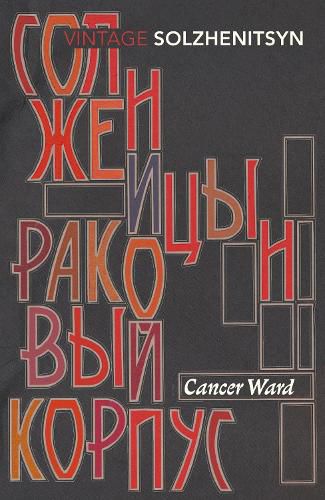Readings Newsletter
Become a Readings Member to make your shopping experience even easier.
Sign in or sign up for free!
You’re not far away from qualifying for FREE standard shipping within Australia
You’ve qualified for FREE standard shipping within Australia
The cart is loading…






‘Without a doubt the greatest Russian novelist’ Sunday Times
FROM THE NOBEL PRIZE-WINNING AUTHOR OF THE GULAG ARCHIPELAGO
‘Solzhenitsyn is one of the towering figures of the age, as a writer, as moralist, as hero’ Edward Crankshaw
After years in enforced exile on the Kazakhstan steppes, a cancer diagnosis brings Oleg Kostoglotov to Ward 13. Brutally treated in squalid conditions, and faced with ward staff and other patients from across the Soviet Union, Kostoglotov finds himself thrown once again into the gruelling mechanics of a state still haunted by Stalinism.
One of the great allegorical masterpieces of world literature, Cancer Ward is both a deeply compassionate study of people facing terminal illness and a brilliant dissection of the cancerous Soviet police state. Withdrawn from publication in Russia in 1964, it became, along with One Day in the Life of Ivan Denisovich, a work that awoke the conscience of the world.
$9.00 standard shipping within Australia
FREE standard shipping within Australia for orders over $100.00
Express & International shipping calculated at checkout
Stock availability can be subject to change without notice. We recommend calling the shop or contacting our online team to check availability of low stock items. Please see our Shopping Online page for more details.
‘Without a doubt the greatest Russian novelist’ Sunday Times
FROM THE NOBEL PRIZE-WINNING AUTHOR OF THE GULAG ARCHIPELAGO
‘Solzhenitsyn is one of the towering figures of the age, as a writer, as moralist, as hero’ Edward Crankshaw
After years in enforced exile on the Kazakhstan steppes, a cancer diagnosis brings Oleg Kostoglotov to Ward 13. Brutally treated in squalid conditions, and faced with ward staff and other patients from across the Soviet Union, Kostoglotov finds himself thrown once again into the gruelling mechanics of a state still haunted by Stalinism.
One of the great allegorical masterpieces of world literature, Cancer Ward is both a deeply compassionate study of people facing terminal illness and a brilliant dissection of the cancerous Soviet police state. Withdrawn from publication in Russia in 1964, it became, along with One Day in the Life of Ivan Denisovich, a work that awoke the conscience of the world.